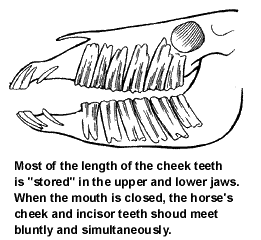|
|
A UNIQUE NATURAL DESIGN
 |
Did you ever wonder why,
when the dry season comes, grass merely turns yellow but does not wilt like
your houseplants do when they need water? Grass blades are internally supported
by a ladder-like "skeleton" of silica. This is in addition to cell
walls like those which make a stalk of celery stiff. Silica is what a pane of
glass is made of, or quartz rock, or sand. With every mouthful of food he
takes, it is as if your horse has to chew up a certain amount of ground
glass.
|
| Since his diet
differs so much from yours, there are a lot of differences between your mouth
and teeth and those of your horse. The first thing to notice about the normal
equine mouth as a whole is that, when the mouth is closed, the incisors and
cheek teeth meet bluntly and simultaneously. The lengths and angles of the
incisors and cheek teeth must match precisely to permit the horse to chew
properly. By contrast, your incisors overlap to allow your cheek teeth to
meet. The length of the crowns of the
teeth in horses is much greater than in people. Most of the length of your
horse's cheek teeth is "stored" within his upper and lower jaws. Only
about 1/2 inch of each cheek tooth actually protrudes from the gum. As grass
wears the teeth, they push out from their sockets like lipsticks. The pressure
of chewing helps the body regulate the rate at which the teeth push out.
|
 |
 |
In the wild, when an
animals's teeth wear out, it dies. Long tooth crowns are the main factor that
compensates for the abrasive silica in grass, and thus in the wild, are the
ultimate determinant of a horse's lifespan. Domestic horses can be kept alive
on special feeds even after all teeth have worn out. However, this is a last
resort. Modern equine dentistry can significantly extend the useful lifetime of
your horse's teeth as well as enhance his comfort and your safety under the
artificial condition of bitting.
|
The
information and illustrations in this section are kindly provided by the
Canadian Equine Dental Consultants and the American Equine Dental Consultants.
For further information please visit their website -
click here
|
 |
Canadian Equine
Dental Consultants
American Equine Dental Consultants
Email:
cedc@telusplanet.net
Website:
www.equinedental.com |
 |
|
|

